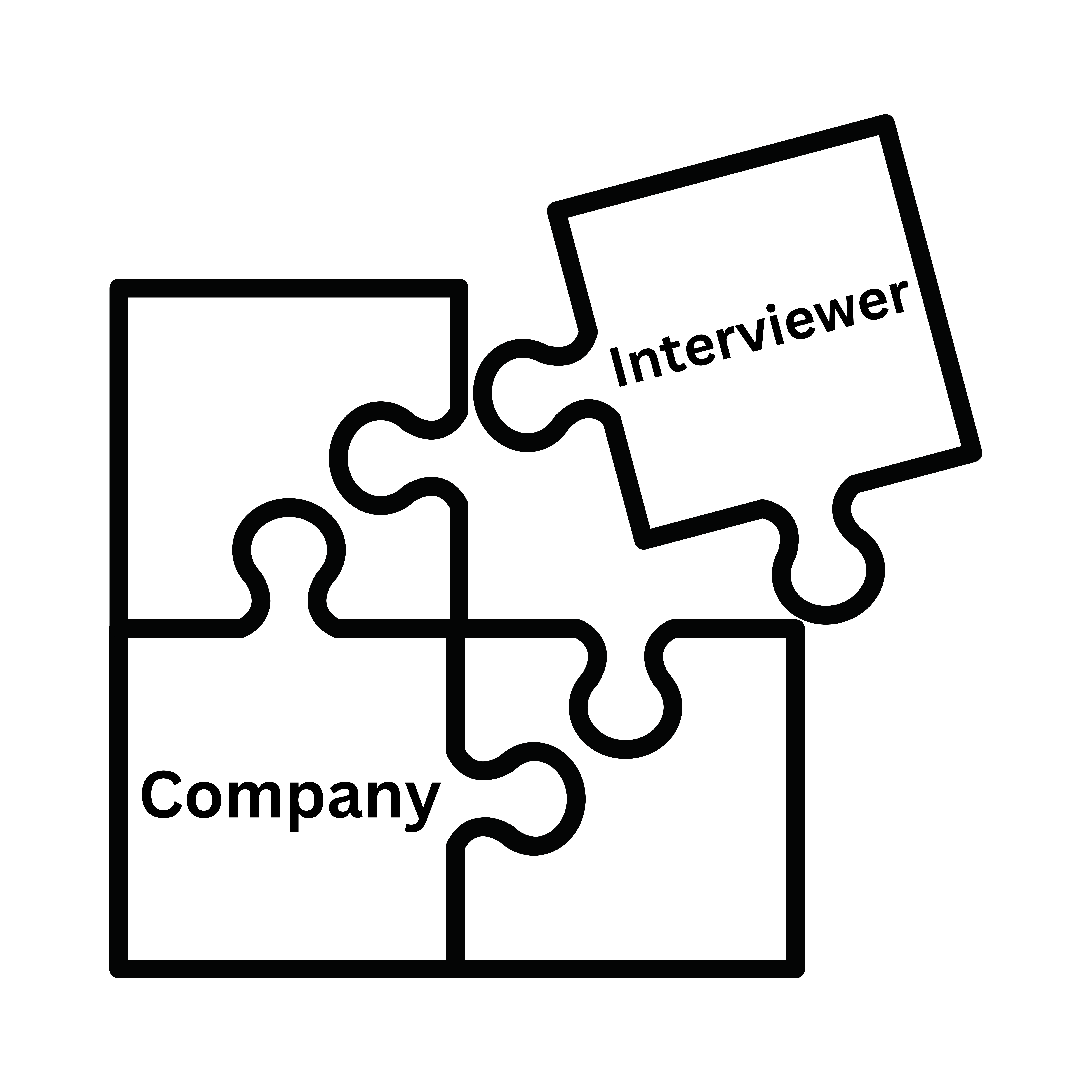Join me...
Job Interview Questions: Asks and Answers; Do’s and Don’ts
Hi,
I’m Alix and it’s my mission to help as many of the next generation as possible work in jobs that meet their passion and purpose, making them happy and fulfilled adults. Providing support and hand holding where they may not have any.
Be a ‘virtual mentor’ if you like that you can visit and search for hints and tips…
Join me in making sure you’re one of the new generation of adults working in a job you love, reaching your potential.
Today we’re looking at a critical part of the interview – questions, so, as ever with my articles, grab a snack and we’ll dive in…

The importance of questions…
Questions are an inevitable and important part of the interview process. But preparing and practicing for them will allow you to relax, knowing you’ll ace it.
It’s partly about not being caught out or making you flustered, leaving you stuttering and stammering, red-faced as you search for an answer.
But it’s also about using questions to impress whoever’s interviewing you, leaving a lasting impression – of the good kind of course.
It’s also about showing you’re confident while demonstrating your character and is your chance to show how you’ll fit into the company seamlessly.
And, as they learn more about you, you’ll know that when they ultimately make their decision, they’ll have considered your fit with any team you’ll work with, giving you confidence on your first day.
But also…
It’s part of the two-way idea of interviews. Yes, they’re interviewing you, but you’re also interviewing them to make sure you want the job.
So, don’t fear questions, embrace their interaction, use them to your advantage

Now, let’s investigate common asks with suggested answers, followed by delving into the do’s and don’ts when it’s your turn to quiz them:
Asks and Answers…
?: Why are you leaving your current job?
Think. A common question as they drill down to see if you’re leaving of your own accord, or being forced out because you’re a difficult employee, can’t work with a team or are disruptive. They want the comfort of knowing you’ll fit in easily with their employees.
If it’s because you have one of those bad bosses, or there’s a colleague you just can’t face any more, never, ever, bad mouth them, no matter how much therapy you’ll get from discussing them, their faults and what should happen to them.
✅: A positive answer could be any one of the following
- I’ve simply outgrown the role and am looking to develop new skills;
- there’s no possibility for promotion for my skill set;
- I’m looking for more responsibility;
- I’m looking for a company to grow with;
- I want to move nearer home; or
- Another practical reason.

?: Where do you see yourself in five years?
Think. This is a trick question to see how committed you’d be to the company.
Training a new employee, if only in how the company works, takes time. Time is one of the bottom-line considerations, ie, it costs money, so they want to know you’ll be staying.
✅: A positive response could be:
- From what I’ve seen, I believe your company has a more structured promotion path and I want to grow with you; or
- I want to learn a different set of skills to complement those I’ve got and then go further with you.
Note: I was interviewing a promising candidate but when I asked this question, they answered that they planned to open their own fitness studio in six months. As we were looking for a long-term employee, this simply didn’t fit. Training someone for the role only to have them leave shortly after would have been a waste of time and resources. Having said this, do not mislead any interviewer just so that you get the job whilst knowing you’ll be leaving soon, that would simply not be fair.
Performance questions…
Performance questions assess how you've handled past situations. By preparing for discussing any weaknesses, your answers will be ready. It’s essential to be honest and transparent while framing responses positively.
We’re all only human (including your interviewer). It’s how you dealt with challenges that’s important. Don’t be defensive, simply explain how you used what you learnt to approach a similar situation differently.
?: What has been your biggest work failure?
Think. Potential employers are looking to see if you learn from mistakes.
- The mistake itself is almost irrelevant – it’s how you dealt with it that’s important;
- Look for a way to show how you triumphed brilliantly in the face of adversity;
- Again, never blame a colleague, or boss, or junior member of the company – even if it was their error.

✅: Focus on what happened and the result instead:
- If it was the ‘fault’ (a word I personally hate!) of one person, you can explain how you learnt how important it is to allocate the best person to a task, showing a valuable leadership quality;
- you don’t need to take the blame (another word I personally hate!) but you can turn an answer into how you learnt that sometimes tasks need to be micro-managed, ie overseen more closely than you realised. That is, you learnt from the process, another valuable leadership quality;
- Don’t get defensive, simply explain how you used what you learnt to approach a similar situation differently.
It’s essential to be honest and transparent while framing responses positively.
Prospective employers will use your answers to see how you would fit within the organisation, assess your problem-solving skills, adaptability, self-awareness, and teamwork abilities.
?: What are your salary expectations for the job?
Think: A difficult topic but navigating it can be done.
Companies ask because it guides them on what to offer, though there should have been an indication in the job advert itself. Similarly, if there was a salary range in the advert, companies could want to see if you can be brought in for less than any maximum amount they quoted.

You should go into any interview with an idea of what you need to be able to survive, and what you’re worth. Just look at similar jobs to yours and you’ll have a good starting point.
Don’t always go by what you’re earning now.
Note: I’m a stayer, taking on a role and settling in. While working for a multinational bank I became aware that new employees in the same role I was in were being offered several thousands more to entice them in.
Giving yourself a range gives you a definite starting point, but avoid the following no-no’s:
- If there was no indication, giving a low number could encourage a company to offer you less;
- Responding with too high a number - could encourage a company to believe you’re too expensive for them;
- Responding with ‘don’t know’ - could leave you open to be offered less than you’re worth;
- Giving a straight number – could make you seem inflexible;
- Telling them what you earn at the moment, a common reason for moving jobs is looking for a salary increase;
- Using words like, expect, hope, whatever, it’s not important or a shrug.
✅: Being prepared with the following opens the door to discussions further down the line:
- Can you confirm the salary range and any additional elements of the overall package, ie what is the pension scheme component, how much holiday does the company give?
If there’s no range:
- I’m flexible, depending on the whole package.
This way you avoid being offered less than you want, but don’t come across as either too expensive or inflexible. Remember, they’ll be working to a budget set by the higher-ups.
If the money isn’t what you need, always keep it professional – you never know whether, if this job doesn’t work out, another opening might come up and, having made a positive impact on your interviewer. They could remember you for the new job. So, explain that unfortunately you were looking for slightly more, but you’re very interested in the company.
That leaves everything in the interviewer’s hands. They may not be able to offer you this role (being constrained by the all-important company budget) but any new job that comes up they could remember your positive interview.

Adaptability…
Always be prepared to adapt if the interview veers along an unexpected path. But, if this happens, stop and think:
- Answer unexpected questions with poise;
- Take a moment to pause, then use these as an opportunity to showcase your ability to think on your feet;
- Consider the job’s expectations and link your answer to how you can add value to the company when responding;
- Be aware that you could be asked a trick question that has no right or wrong answer. Simply be honest with your response, whatever their reason for asking it, honesty beats fumbling hands-down.
Red flag questions…
Some questions should be viewed as red flag questions, ones that can tell you a lot about their expectations, ie watch out for an over-use of personal questions you’re being asked.
Try and gauge whether the interviewer is probing to know whether you’re likely to be able to work hours way above what’s being advertised.
Getting the work-life balance right can be difficult, especially when you first set out in the employment world. Perhaps you don’t have any family ties – children or a partner – and are free to devote more time to work, but this could change, so keep an eye on what you’re being asked and weigh it up carefully.

Note: I was working with a colleague whose boss told her as he asked her to work late yet again, ‘What’s the problem, you don’t have a partner to rush home to’, to which she replied without any hesitation, ‘And if I continue to work these hours, I never will!’
When you work extra hours on a regular basis, they become expected. Be careful to manage this aspect. Although I want you to work in a job that makes you jump out of bed to get the day started, you do need the balance of time out and a change of scene.
Do’s and don’ts…
Towards the end of the interview, you'll likely have an opportunity to ask the interviewer questions.
Take time to prepare these. Now it’s less about the interviewer evaluating your fit for the role and the company, it’s more about you clarifying anything that is important while assessing whether the job aligns with your goals and values.
Asking thoughtful questions, is a powerful way to gather vital information and demonstrate your interest. Remember to tailor your questions based on the information you've already gathered during the interview or your research:
Some topics to consider follow, but not all will apply to every interview. Some will only be relevant when applying to multi-national companies, as opposed to a small local firm, but they’re listed for you to look through and could help you when thinking about what’s relevant to you and your interview.

Remember to tailor your questions based on the information you've already gathered during the interview or your research, so it relates to the job:
Do’s:
Previous holder questions:
- Could you let me know how the job opportunity arose?
- What happened to the previous holder?
- How long were they in the position?
- Are you happy to share why they’ve moved?
I admit that I hesitated before finally deciding to add this topic. My feeling is that it’s important. Knowing how long the previous occupant was in the role could raise red flags that need investigating, OR it could be that the person’s been promoted which is a huge pull, evidencing the company’s promotional path. See how the interview goes and ask if you feel comfortable.
Performance expectations:
- Could you provide more details about the day-to-day responsibilities of this role?
- How does this role contribute to the overall success of the company?
- What are the short-term and long-term goals for the person you’re looking for?
- What are the key performance pointers you'd like to see from the person?
- How will you measure success for this position?
- What does a successful first year in this role look like?
Feedback and evaluation:
- How often and what is the process for performance evaluations?
- What is the leadership style within the organisation overall?
- How does the company encourage communication between managers and team members?

Challenges and expectations:
- What are some of the challenges the team has faced recently and how were they addressed?
- What do you consider to be the most critical skills or qualities for success in this role?
- How often are tasks set against a critical deadline?
- Are there additional skills I can bring?
- How does the company handle adversity and unexpected changes?
Collaboration and team dynamics:
- How does this role/department interact with other teams within the company?
- Can you describe the team dynamics and communication style within the team?
- What opportunities for cross-functional collaboration are available?
Professional development and growth:
- Does the company offer opportunities for further education or skill development?
- What career advancement opportunities are available within the organisation?
- Can you share examples of how employees have grown within this company?
Work-life balance:
- How does the company support employees in maintaining work-life balance?

Company differentiators:
- What sets this company apart from its competitors?
- Why do employees choose to work for this company?
Company performance and growth:
- Can you share insights into the company's recent achievements or growth?
- What are the company's short-term and long-term goals?
- How has the company adapted to industry changes in recent years?

Next steps and timeline:
- What are the next steps in the interview process?
- What is the expected timeline for making a decision?
- Is there anything else you'd like to know about my qualifications?
Don’ts:
There are several questions you don’t ask at this stage as follows:
- Negotiating the salary offered. A first interview is not the time to raise that you want more. Wait until you have details on the whole package and take it away to think about it. There may be other aspects, like rapid promotion within the company, that makes taking a (slightly) lower than hoped-for salary right now a good idea;
- It’s okay to clarify the package that comes with the position, ie pension scheme, paid time off for studying and exams, but not to ask about why you should take the job in the sense of what the company can give you. It’s all about how you phrase the question;
- Negotiating flexible working hours. It’s important to show keenness to work, not ask to work different hours (unless it’s absolutely necessary);
- Asking about working from home – could imply you won’t be happy working in an office or commuting.
Note: I worked with a colleague who, on returning from two years’ sick leave, asked to work from home. The fact that she was the office receptionist and responsible for such things as franking the post, was a clue as to whether this could possibly work for the company!

However, the interview goes, including disappointing answers to questions you’ve asked, always keep it professional – you never know whether, if this job doesn’t work out, another opening might come up and, having made a positive impact on your interviewer. they’ll remember you for the new opening. You’d just need to review the disappointing answers and decide how critical they are.
Conclusion…
So, there’s a few things to think about. Not all questions will come up, however, being prepared will give you the confidence to walk into an interview ready.
You can ace an interview with preparation and remember, it’s a two-way process, use it to find out what you need to about the role.
But now, I’d love to hear how you’re getting on and, where possible, if we can help more. Drop me an email, and lastly, I want to both wish you luck and say that I know you can do it.
Success is within your grasp!
